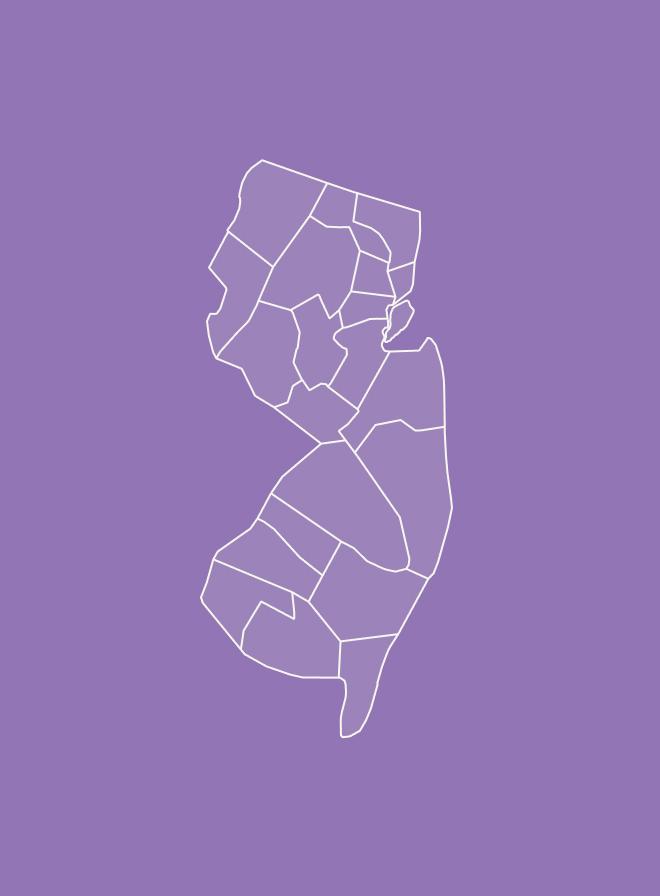Table of Contents
Supporting Those Facing Workplace Sexual Harassment in New Jersey
The Equal Employment Opportunity Commission issues a report each fiscal year on the number of complaints filed with them. In 2024, there were 9,328 complaints based on sex discrimination, including sexual harassment. Of those complaints, 408 were filed in New Jersey.
Sexual harassment at work is not only common in New Jersey — it’s illegal. You do not have to lose your job to have a claim, and you do not have to stay silent if you’re being mistreated. Under the New Jersey Law Against Discrimination (NJLAD), workers are protected from harassment, discrimination, and retaliation across all industries and workplaces. Unlike federal law, NJLAD covers employers of all sizes, even a single employee.
HarassmentHelp.org is here to provide confidential resources, explain your rights, and connect you with trusted support.
Who We Are – HarassmentHelp.org
HarassmentHelp.org is a project of Phillips & Associates PLLC, a law firm focused on workplace sexual harassment and employee rights. Created by award-winning sexual harassment lawyers, we provide confidential support and safeguard employees from retaliation to end harassment, recover compensation, and protect their careers.


Support and Guidance With Your Needs in Mind
Know Your Rights Under New Jersey Law
What Are Your Rights?
New Jersey protects all employees – part-time and full-time – from sexual harassment:
- State Protections: NJLAD applies to all employers, regardless of size.
- Statute of Limitations: Generally, you have 2 years to file a lawsuit in civil court. Complaints to the NJ Division on Civil Rights must be filed within 180 days.
- Protection from Retaliation: It is unlawful for your employer to punish you for reporting harassment, even informally.
Employers must have written policies explaining reporting and rights. The law requires harassment to be “severe or pervasive” to be unlawful. That typically means you must have been subjected to a series of repeated incidents that created a hostile, abusive, humiliating, or intimidating atmosphere for you at work. In some cases, a single severe act (like an assault) will be enough, but courts generally look for patterns.
Do You Have to Report Sexual Harassment Before Doing Anything Else?
No. You’re not required to report internally first, but doing so can give your employer a chance to fix the problem. If you’re considering reporting internally but are concerned about retaliation or not being taken seriously, HarassmentHelp.org can help. We can help you document the incidents, ghost-write messages to HR or your supervisor, and ensure your rights are protected every step of the way.
What Sexual Harassment at Work Looks Like in New Jersey
Harassment can happen anywhere: in casinos along the Atlantic City boardwalk, in restaurants and hotels that serve seasonal tourism, in classrooms and labs at New Jersey’s universities, or in corporate offices tied to pharma, tech, and finance. Agricultural and warehouse workers also face heightened risks, often without clear reporting structures or HR support. Workers are protected whether misconduct is verbal, physical, digital, or tied to a power imbalance.
Inappropriate Comments and Sexual Jokes
Unwanted remarks may be framed as “jokes” or compliments but still create a hostile environment. For example:
- A casino manager telling a cocktail server she’d “get better tips if she dressed sexier.”
- A customer at a retail shop making repeated comments about an employee’s body.
- A supervisor suggesting a teacher or lab assistant would “get further” if they looked or dressed differently.
Unwanted Touching and Physical Contact
Physical harassment includes any nonconsensual contact — even if disguised as friendly. Examples include:
- A hotel guest hugging or grabbing staff during a shift.
- A co-worker brushing against you intentionally in a crowded kitchen or breakroom.
- A business owner putting a hand on your back or waist in a way that makes you uncomfortable.
- A supervisor leaning in too close at a conference or work dinner.
Digital Harassment and After-Hours Pressure
Technology makes it easier for harassment to follow workers outside the workplace. Examples include:
- Late-night texts from a manager during a work trip turning flirtatious or sexual.
- A team lead sending sexually suggestive memes or emojis in a group chat.
- Pressure to respond to direct messages on workplace apps long after hours.
Persistent Flirtation and Pressure
When you’ve said no but the attention continues, it can quickly cross into harassment. For example:
- A colleague repeatedly asking you out after clear refusals.
- A supervisor continuing to compliment your appearance despite boundaries.
- Retaliation or hostility after rejecting advances at a staff outing.
Quid Pro Quo Harassment (“This for That”)
Quid pro quo sexual harassment happens when job opportunities, benefits, or protections are conditioned on sexual favors. It’s not always subtle — sometimes it looks like a shift lead at a restaurant offering prime hours if you agree to go on a date. Other times it’s more coercive, like a manager threatening to cut your schedule after you reject advances. In academic or training settings, it might be a professor implying that grades, recommendations, or mentorship depend on intimacy.
No matter how it’s framed — as a reward for saying yes or a punishment for saying no — tying workplace benefits to sexual attention is unlawful in New Jersey. These actions exploit power imbalances, create hostile environments, and place workers in impossible situations where their livelihood feels at stake.
Coercive Relationships and Grooming
Sometimes harassment begins with “special attention” that evolves into pressure. Examples include:
- A senior partner offering mentorship in exchange for late-night meetups.
- An executive giving favorable assignments that later come with expectations for secrecy or intimacy.
- A supervisor isolating a worker from colleagues to exert control.
Retaliation and Aftermath
Retaliation for speaking up is illegal in New Jersey. It can happen even without being fired. Examples of retaliation include:
- Having your hours reduced after rejecting advances.
- Exclusion from projects or client-facing roles following a complaint.
- Rumors or hostility instigated by a person in power.
- Being reassigned to a distant worksite or inconvenient location as “punishment.”
- Loss of professional development opportunities, like training sessions, conferences, or networking events.
- Having your workload increased unfairly or being set up with unrealistic deadlines to create pressure.
Workplace Sexual Harassment Occurs in NJ’s Top Industries
Harassment doesn’t always look obvious. In fast-paced and diverse industries, it often takes subtle forms that are easy to dismiss or hard to report. Here are a few examples of what sexual harassment can look like in New Jersey workplaces.
Healthcare
New Jersey’s healthcare facilities, from hospitals to nursing homes, are responsible for supporting millions each year. In these settings, harassment can come from co-workers, supervisors, or even patients. Workers may face inappropriate comments, unwelcome touching, or sexual advances.
Retail
From big-box stores and shopping malls to small boutiques along the Jersey Shore, retail workers in New Jersey frequently encounter harassment from managers, co-workers, and customers. Employees may be subjected to unwanted comments about their appearance, inappropriate touching from shoppers, or pressure from supervisors who control scheduling and sales opportunities. Because many retail jobs depend on flexible hours and customer satisfaction, workers often feel silenced or afraid to push back against misconduct.
Hospitality and Food Service
With countless restaurants, wineries, hotels and event venues across the state, hospitality workers frequently deal with harassment on the job. This might include unwanted physical contact, sexual remarks from customers or other employees, or being pressured to tolerate inappropriate behavior to keep shifts or tips.
Arts and Entertainment
From theaters and music venues to television production and museums, New Jersey’s arts and entertainment sector creates unique risks for harassment. Workers may face inappropriate casting or audition comments, pressure to socialize after hours, or blurred boundaries at industry parties and events. Because careers in this field often rely on networking and reputation, many victims feel they cannot safely speak out without risking future opportunities.
Tech and Engineering
New Jersey’s growing tech hubs and engineering firms may see harassment through exclusion from projects after rejecting advances, inappropriate messages on workplace platforms, or pressures to “just deal with” uncomfortable behavior in favor of avoiding friction in smaller teams.
Construction and Skilled Trades
A traditionally male-dominated field, New Jersey’s construction sites and skilled trades can be hotspots for harassment that’s ignored or normalized. Workers might face lewd comments, sexual propositions, catcalling, or hostile behavior that creates a difficult or unsafe work environment.
Education and Research
Teachers, professors, and research staff in New Jersey’s schools and universities may encounter harassment ranging from inappropriate remarks to abuse of authority, often complicated by power dynamics and fear of retaliation. Beyond academia, New Jersey’s strong biomedical and pharmaceutical research sectors also present risks. Lab technicians, clinical researchers, and support staff may face inappropriate behavior from supervisors, senior scientists, or corporate managers, particularly in environments where long hours, grant funding, and competitive pressures can make workers hesitant to report misconduct.
Logistics and Warehousing
With major shipping hubs, trucking corridors, and distribution centers, New Jersey’s logistics and warehousing industry employs thousands of workers. Harassment in this field may take the form of unwanted physical contact in isolated warehouses, crude remarks during overnight shifts, or pressure from supervisors who control schedules and overtime. Workers in these roles may feel particularly vulnerable because of high turnover and the fear of being easily replaced.
Casinos and Gaming
New Jersey’s casinos, especially in Atlantic City, employ thousands of dealers, servers, security staff, and hospitality workers. In these environments, harassment often comes from both co-workers and patrons. Workers may face unwanted touching on crowded gaming floors, sexual comments from intoxicated guests, or pressure to “play along” with inappropriate behavior to avoid losing tips or repeat business. Because jobs in casinos are highly dependent on customer service and scheduling, employees may feel they have little choice but to tolerate misconduct, making employer accountability critical.
The HarassmentHelp.org RGA Approach
We guide you through RGA — Rights, Guidance, and Action, a safe and supportive process designed to help you protect yourself, preserve your career, and stop harassment.
- Rights – Understand Your Protections
We help you understand what’s acceptable in the workplace, what crosses the line, and how the law protects you from harassment and retaliation. - Guidance – Build Your Case Safely
We offer confidential, nonjudgmental support before any formal action, helping you evaluate the safest and most effective steps for your situation. - Action – Take Steps With Full Support
You never have to face harassment on your own. We can help you create a plan that feels safe and manageable, and connect you with trusted sexual harassment attorneys who can draft complaints, handle communication for you, or work toward a private resolution.
What To Do If You Are Experiencing Sexual Harassment at Work in New Jersey
If you’re experiencing harassment, here’s how the RGA approach works in real life:
Document What Happened
Write down the incident details as soon as possible—date, time, location, who was involved, and exactly what was said or done. Note any witnesses and save relevant messages, emails, or voicemails. The more detail you record, the stronger your case becomes.
Decide Whether to Confront the Harasser
You are not required to confront the person harassing you. Only consider it if you feel completely safe and supported. In some cases, telling them their behavior is inappropriate and unwelcome may stop it. If you’re unsure, uncomfortable, or fear retaliation, we’ll help you evaluate safer alternatives.
Report the Behavior—Safely and Strategically
Reporting harassment without preparation can be risky. We may be able to help you:
- Prepare a complaint or other communication with clear legal language that documents your rights.
- File a formal complaint with your employer or HR in a way that creates a legal record.
Even if your workplace doesn’t have an HR department, a written complaint to a manager, owner, or supervisor still matters. If harassment comes from a customer or client, your employer is still responsible for addressing it.
Explore a Quiet Resolution Before Filing a Formal Complaint
Sometimes you may want to resolve the situation without going public. Our attorneys can:
- Prepare a confidential summary of events.
- Outline the harm done and your legal protections.
- Communicate directly with your employer respectfully but firmly.
This approach can result in an immediate end to harassment, schedule or department changes, removal of the harasser, or a mediated agreement—without public exposure.
How HarassmentHelp.org Supports You Every Step of the Way
Here’s what working with us looks like from start to finish:
- Confidential Conversation – Share your story in a safe space — no pressure to act right away.
- Evidence Building – We help you keep detailed records of incidents, messages, and witnesses.
- Strategy – Connect you with top sexual harassment attorneys who can help with preparing complaints, filing complaints on your behalf, or pursuing private resolutions.
- Protection from Retaliation – Take proactive steps to safeguard your job, career, and reputation.
Resources for New Jersey Employees
- New Jersey Division on Civil Rights (NJ DCR)
Investigates workplace harassment complaints and enforces protections under the New Jersey Law Against Discrimination. - New Jersey Coalition Against Sexual Assault (NJCASA)
Coordinates statewide support services and operates a 24/7 hotline for survivors of sexual violence.



